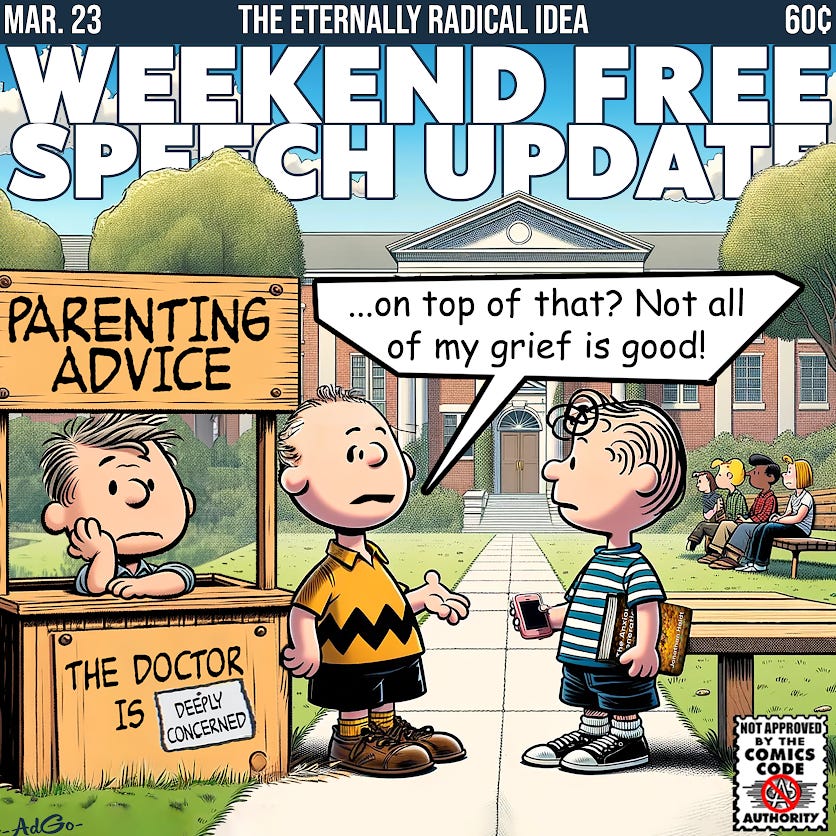‘Reverse CBT’ in UnHerd, free speech as ‘The Language of the Powerless’ & more John Cleese!
Bringing you the latest free speech news (3/23/2024)
Stories of the week
What’s behind the campus mental health crisis? by me for UnHerd
The data shows that ideology, race and gender are all statistically significant predictors of self-reported mental health, with liberals having the worst self-reported mental health compared to moderates and conservatives, and women having worse self-reported mental health than men. What’s more, the interaction between race, ideology, and gender is statistically significant — with liberal white and non-white women having the worst self-reported mental health. This trend has also been reported by Zach Goldberg and Haidt using Pew Research’s data, as well as findings from Gimbrone et al.
“Free Speech is the Language of the Powerless” — Student Audrey BadjouenDzouabet reflects on the value of disagreement from Amna Khalid’s Banished Substack
Enabling a culture of free speech would also remove the need for hate speech laws. The broad definitions of hate speech can and have been used against those they are meant to protect.[16] Learning about the dangers of hate speech laws and how similar they are to blasphemy laws made me reconsider the language of harm that we use today to advocate for censorship in spaces of higher education.[17] When we allow harm to be the driving force of censorship, especially in education, we are, as the saying goes, “condemned to repeat history.”
This week in ERI
The skeptics were wrong, part 2 — When it comes to free speech, the kids are not alright by Sean Stevens and me
This week in FIRE’s blog
University of Maryland quickly lifts blanket suspension of fraternities and sororities after litigation, public pressure by Zach Greenberg
NRA case shows the Supreme Court must stop informal censorship by Abby Smith
Utah enacts FIRE’s model bill, protects due process on campus
Supreme Court considers when government ‘persuasion’ becomes unconstitutional coercion by Talia Barnes
West Texas A&M President cancel student charity drag show for second time
Northwestern alumni draft open letter supporting free expression and institutional neutrality by Jessica Wills
FIRE ramps up pressure on New Jersey board to stop suppressing free speech during public comments period by Isabelle Brito
Virginia Commonwealth University earns top rating for free speech
College students defend speech and incitement — when it benefits them by Sean Stevens
International free speech stories of the week
Free Speech Dispatch — March 2024: Alarming new legislation in Canada, worsening repression in Hong Kong, and online global takedowns emerging from India by Sarah McLaughlin
The threats to free speech in one country, and the conditions or events that cultivate them, can grow into regional or global censorship campaigns, from suppression of commentary about the Israel-Hamas war to the silencing of exiled critics of the Russian and Chinese governments. Even voices in ostensibly free countries can be stifled.
That’s why FIRE is launching the Free Speech Dispatch, a new series covering some of the censorship trends and challenges around the world. In each edition, we’ll help readers glean a better understanding of the global free speech landscape.
Scotland’s new Hate Crime Act is fraught with danger (Spectator) by Lucy Hunter Blackburn
The law doesn’t just apply to social media posts or newspaper articles. It covers anything said anywhere – even in your own home. Children will in theory be able to report their parents. Scots can inform on each other anonymously, through an expanded network of ‘third-party reporting centres’. The list of centres includes a striking number of university campuses, as well as a Glasgow sex shop and a North Berwick mushroom farm.
London Calling: Ronnie’s First Amendment Rundown
FIRE General Counsel Ronnie London has kindly agreed to help keep readers apprised of the latest developments in First Amendment jurisprudence:
R J Reynolds Tobacco Co. v. FDA sees another federal appeals court added to the growing number allowing the government to compel speech in ads and on labels, even if it’s not to avoid potential consumer deception – and in doing so rejecting “that, to be factual, the information must be true” to satisfy the Supreme Court’s test.
Video of the week
You may recall that last summer I flew to England to be interviewed by the legendary comedian John Cleese (I detailed the experience in a previous Substack post, ‘Meeting John Cleese while naked.’) Well, a couple weeks ago I had the great honor of turning the tables and interviewing John. Keep an eye out for the full interview, but in the meantime enjoy this clip of John talking about censorship of comedy.






The New Puritans of the woke left fear humour because it calls out hypocrisy and laughs at it. We should scare the shit out of them.
Your article reminded me of this detailed piece by al-Gharbi that I’m sure you’re familiar with. I really loved how careful he was in his analysis and how he concluded with this important qualifier:
“Critically, these facts don’t tell us anything about which worldview is morally correct. Outside of Randian objectivism, it is widely acknowledged that what is maximally advantageous for oneself is not necessarily the most moral thing to do. Doing the right thing instead regularly imposes risks and costs on those who step up. Consequently, the fact that conservatism has practical advantages for adherents while liberalism may undermine well-being doesn’t necessarily tell us which ideology is more ethical to hold. Those are questions better suited for theology and philosophy than social science.”
https://americanaffairsjournal.org/2023/03/how-to-understand-the-well-being-gap-between-liberals-and-conservatives/